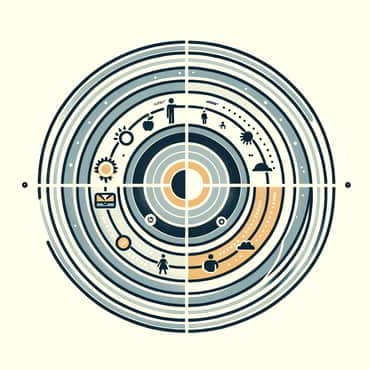The Power of Habit: Build Systems That Stick

Estimated reading time: 6 Min
Daily habits shape long-term results. Learn how to design small, strategic behaviours that lead to consistent business growth.
Habits, those repetitive actions we do almost unconsciously, are powerful tools for personal and professional growth.
Once they are formed as habits, they are, in reality, part of our subconscious mind.
They shape our days, define our productivity, and ultimately sculpt our lives.
So be careful what habits you form!
Here we explore how we can harness the power of habit to boost our productivity.
By aligning our values and beliefs with our daily, weekly, and monthly routines, we can create a rhythm of efficiency and success.
The Foundation of Productive Habits
At the heart of every productive habit lies a core set of values and beliefs, which collectively make up our mindset.
These are the guiding principles that give meaning to our actions and motivation to our goals.
For example, if you value health, you’re more likely to adopt habits that enhance well-being.
Similarly, if you believe in continuous learning, you’ll naturally gravitate towards habits that expand your knowledge.
But how are these habits formed?
It all starts in our conscious mind with willpower.
Every time we repeat an action consciously, our brain takes a shortcut, creating neural pathways that make it easier to repeat that action in the future.
This process is why we can eventually perform tasks like riding a bike, typing, or kicking a football without much conscious thought.
The more we repeat a task, the more ingrained it becomes, turning it into a habit.
Developing productive habits, then, begins with a conscious decision to repeat beneficial actions aligned with our values and beliefs.
But it’s not always just about the actions themselves.
It’s about setting up daily, weekly, and monthly routines that turn these actions into unwavering habits.
Crafting Effective Routines
Creating effective daily routines is the first step.
The key here is focus.
Choose one primary activity that aligns with your values and dedicate a specific amount of time each day to it.
Some people find that choosing the same time each day works best for them.
For instance, if writing is your chosen activity, set aside an hour, perhaps each morning, for it.
This focused approach ensures that your most important tasks aren’t left to chance.
Weekly routines bring a broader perspective.

While daily routines are about focus, weekly routines are more about balance.
They allow you to allocate time to different activities that contribute to your overall goals.
You might, for example, reserve weekends for family and hobbies, ensuring a well-rounded approach to life.
Monthly routines, on the other hand, are about the big picture.
This is where you review your progress, adjust your goals, and plan for the long term.
It’s a time to step back, reflect on what’s working and what’s not, and make necessary adjustments.
This regular review and adjustment process is extremely valuable for ensuring that your habits remain aligned with your evolving goals and circumstances.
In the next section, we’ll explore real-life case studies that demonstrate the power of habit in achieving success in various fields.
Case Studies in the Power of Habit
Case Study 1: Sporting Success Through Disciplined Training Routines
Consider the story of a renowned athlete.
Their journey to the top was paved not only with talent but also with unwavering habits of discipline and practice.
Daily training sessions, rigorous weekly schedules, and monthly performance reviews were the cornerstones of their success.
Their commitment to these routines transformed potential into world-class performance, illustrating how consistent habits can lead to extraordinary achievements.
Case Study 2: A Writer’s Daily Habits Leading to Creative Triumphs
Now, let’s consider the habits of the most successful writers.
Their secret weapon?
A steadfast, daily writing routine.
By dedicating specific hours each day to writing, they harnessed the power of habit to fuel their creativity and productivity.
This disciplined approach resulted in a prolific output of work, showcasing the significant impact that daily habits can have on creative success.
Case Study 3: A Musician’s Mastery Through Practice and Reflection
Finally, consider a celebrated musician.
Their mastery of the instrument did not happen overnight.
It was the result of a meticulously crafted routine of daily practice and reflection.
By routinely analysing their performances, refining their technique, and seeking expert mentoring, they achieved a level of skill that captivated audiences worldwide.
This case study exemplifies how structured habits can lead to mastery in any field.
Strategies for Forming Positive Habits
Developing productive habits can be challenging, but with the right strategies, it’s certainly achievable.
Here are some practical tips to help you get started:
- Start Small
Begin with small, manageable actions that you can easily incorporate into your daily life. This could be as simple as reading for ten minutes before bed or taking a short walk after lunch. Small successes build momentum, leading to more significant habit formation. - Set Clear Goals
Define what you want to achieve with your habits. Whether it’s improving health, enhancing knowledge, or boosting creativity, having a clear goal in mind gives your habits purpose and direction. - Maintain Consistency
Consistency is key in habit formation. Stick to your routines as much as possible. Remember, it’s the regularity of the action, not the duration, that ingrains it as a habit. - Focus on One Activity at a Time
Avoid overwhelming yourself by trying to develop too many habits at once. Focus on establishing one habit at a time before moving on to the next. This focused approach ensures that each habit gets the attention it needs to become a part of your routine. - Overcoming Challenges
It’s normal to face challenges like procrastination or a lack of motivation. When these arise, remind yourself of the benefits your habits bring and the goals they help you achieve. Sometimes, adjusting your routine or setting smaller goals can reignite your motivation.
So, be patient with your progress; the formation of positive habits is a journey of small, consistent steps towards your goals.
By aligning your daily, weekly, and monthly routines with your values and beliefs and employing practical strategies for habit formation, you can harness the power of habit to significantly boost your productivity and achieve success.
Summary
In our exploration of the power of habit in boosting productivity, we’ve uncovered several key insights, such as:
- Habits are much more than mere actions.
- They’re reflections of our deepest values and beliefs.
By understanding the psychology behind habit formation, we can harness our control to create routines that drive us towards success.
We’ve seen through various case studies—from athletes to writers and musicians—that disciplined routines are central to achieving excellence.
These routines, whether daily, weekly, or monthly, need not be monumental changes. Instead, they are small, consistent actions aligned with our goals and values.
The strategies for forming positive habits, such as starting small, focusing on one activity at a time, and maintaining consistency, provide a roadmap for anyone looking to enhance their productivity.
Overcoming challenges like procrastination and a lack of motivation is part of the journey, but with perseverance and the right mindset (values and beliefs), these hurdles can be overcome.
In conclusion, improving productivity through habit formation is one of continuous growth and adaptation.
By aligning our habits with our values and consistently adhering to them, we pave the way for lasting success and fulfilment.
If you need to, now take action!
You might not strive for world-class mastery, but whatever you achieve will be dependent on your values, beliefs, and habits.
I hope you’ve found this article informative.
If you’ve found it interesting, please share.
If you have anything to add or questions to ask, I look forward to your comments or messages via the contact form.
🙂
Richard






